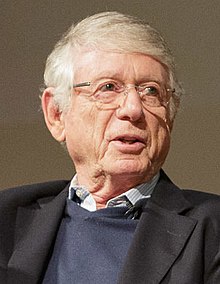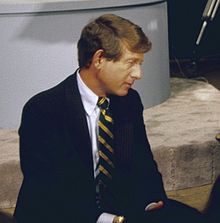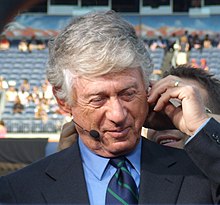Ted Koppel
Ted Koppel (born February 8, 1940 in Nelson , Lancashire , England ) is an American journalist , best known for the TV news magazine Nightline , which he moderated from 1980 to 2005.
Life and work
Koppel is the only child of German- Jewish parents who in the 1930s before the persecution of Jews the Nazis fled to England. The father Edwin owned a large tire company in Germany, the mother Alice was a pianist and singer. Koppel spent his early youth in England, where he also attended boarding school. The family emigrated to the USA in 1953. In the same year, Koppel received American citizenship.
Koppel earned his BA from Syracuse University and his Masters in Political Science and Mass Communication Studies from Stanford University . His journalistic career began with a New York radio station. At the age of 23, Koppel was given a full-time position in the news department of the television station ABC .
In 1968 Koppel became head of the ABC office in Miami , where he was responsible for reporting on Latin America, among other things. From 1969 to 1971 he was the foreign correspondent head of the ABC office in Hong Kong , from where he reported on the East Asia-Pacific region. From 1971 to 1980, Koppel was ABC's main foreign policy correspondent. From 1975 to 1977 he also hosted The ABC Saturday Evening News .
Since the spring of 1980 he has been the main presenter of Nightline on ABC's late night programming. As the first news magazine on this slot, Nightline successfully managed to compete with entertainment programs such as The Tonight Show on NBC and (from 1993) Late Show with David Letterman on CBS . Initially, Koppel directed the show on four and from 1982 on five evenings a week. Since 1981 it has had its length of 30 minutes, which is still valid today. Koppel and the show were increasingly perceived as a unit over the years, and since 1981 it was also called Nightline with Ted Koppel .
After 42 years as a journalist and 25 years as a presenter for one of the station's most famous formats, Koppel left ABC in November 2005. He continues to work as a journalist, including as a guest columnist for the New York Times and as a radio commentator. He has also appeared on the BBC as an expert on American politics .
In addition to English, Koppel speaks fluent German, Russian and French. Koppel raised four children with his wife, Grace Anne Dorney, a lawyer with whom he has been married since 1963. The daughter Andrea Koppel worked from 1993 to 2007 as a correspondent for the news channel CNN . Ted Koppel lives with his wife in the state of Maryland .
Focus of his journalistic work
Since 1964, Koppel has accompanied every election campaign for the American presidency. As a correspondent in Hong Kong, reporting on the Vietnam War was one of his most important areas of responsibility. As ABC's chief foreign policy correspondent, he accompanied Henry Kissinger on numerous trips abroad. The two became friends and Kissinger was later a frequent guest on Koppel's broadcasts. During his time as the main correspondent, Koppel and his friend and colleague Marvin Kalb wrote the bestselling novel In the National Interest , which was also published in German in 1979.
Koppel achieved national fame during the hostage-taking of Tehran when he repeatedly directed the ABC's special every evening under the title The Iran Crisis: America Held Hostage about the fate of the 52 US diplomats held hostage. When the show was converted into a permanent news magazine under the new name Nightline in the spring of 1980 , Koppel became the main presenter. With the exception of a brief period in 1983, the half-hour broadcast was always dedicated to a single topic during Koppel's time.
Koppel made a name for himself as an unyielding questioner who also did not shy away from addressing the private life of public figures. He had his highest ratings with Nightline in 1987 on a show in which he interviewed the scandal-ridden TV preacher Jim Bakker and his wife. In the same year, the politician Gary Hart , who had been the favorite for the Democratic presidential candidacy for the 1988 elections , confessed to an extramarital affair on Koppel's show, which ended his political career.
As the moderator of Nightline , Koppel also paid attention to foreign policy. In 1985 he made a guest appearance with the show in South Africa for a week , mainly focusing on apartheid politics . In 1990, Koppel moderated a town hall with Nelson Mandela at the City College of New York , during which he asked the South African freedom fighter, who had been released four months earlier from decades of imprisonment, how he called men like Muammar al-Gaddafi , Fidel Castro and Yassir Arafat as “friends “Could see. Mandela declared that he refused to choose his friends or enemies on the basis of others' criteria, arguing that "someone who bases his principles on who he is dealing with cannot be considered a statesman". Mandela asked Koppel why he wanted to involve him in disputes in other countries, and explained that the ANC wanted to solve its problems itself.
During the First Intifada in 1988, Koppel directed a high-profile program on site in which hundreds of Israelis and Arabs took part and discussed the Middle East conflict. After Iraq's invasion of Kuwait in 1991, Koppel became the first Western journalist to report from Baghdad . During the occupation of Iraq by the American armed forces in 2003, he accompanied an American infantry division as an embedded journalist .
Honors
Ted Koppel has received numerous prestigious awards for his work, including the Emmy , the Peabody Award , the Alfred I. duPont-Columbia University Award, the George Polk Award , the Sigma Delta Chi Award of the Society of Professional Journalists and the Overseas Press Club Award. In 1987, The Washington Journalism Review voted him the best interviewer on television and radio. In 1994 Koppel was made a Knight of the Ordre des Arts et des Lettres of the French Republic.
Publications
- In the National Interest. Simon and Schuster, New York 1977, ISBN 0-671-22656-8 (with Marvin Kalb). German-language edition: In the national interest. Novel. Translation by Wilhelm Thaler. Ullstein, Berlin a. a. 1979, ISBN 3-550-06296-6 .
- Nightline. History in the Making and the Making of Television. Times Books, New York 1996, ISBN 0-8129-2478-9 (with Kyle Gibson).
- Off camera. Private Thoughts Made Public. Knopf, New York 2000, ISBN 0-375-41077-5 .
literature
- Stewart Kampel: Koppel, Ted. In: Encyclopaedia Judaica . 2nd edition. Macmillan, Detroit et al. a. 2007. Volume 12, pp. 295-296.
Web links
- Literature by and about Ted Koppel in the catalog of the German National Library
- Ted Koppel in the Internet Movie Database (English)
- Portrait of Ted Koppel on the ABC website
- Portrait of Ted Koppel on the Museum of Broadcast Communications website
Individual evidence
- ↑ In the original: "[A] nybody who changes his principles depending on whom he is dealing that is not a man who can lead a nation."
- ↑ Nelson Mandela destroys Ted Koppel Part 2 , June 21, 1990, accessed June 28, 2015
- ↑ Nelson Mandela Faces Off Against US Imperialists on the Ted Koppel Report; 1990 , May 14, 2014.
| personal data | |
|---|---|
| SURNAME | Koppel, Ted |
| BRIEF DESCRIPTION | American journalist |
| DATE OF BIRTH | February 8, 1940 |
| PLACE OF BIRTH | Nelson , Lancashire , England |


